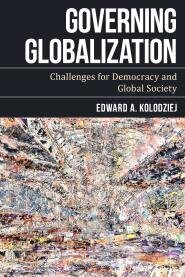
by Lynne Rudasill
September 19, 2016
The articulation of the canon of global studies is ongoing and still incomplete, practical, and intellectual exercise. In Governing Globalization: Challenges for Democracy and Global Society, Ed Kolodziej brings the tenets of Order, Welfare, and Legitimacy (OWL) into the discussion of the effectiveness and legitimacy of democratic solutions to the governance of the global society.
Dr. Kolodziej, Emeritus and Research Professor of Political Science, is the founder and former Director of the Center for Global Studies and co-founder and former Director of the Program in Arms Control, Disarmament, and International Security at the University of Illinois at Urbana-Champaign.
This work begins with a description and development of the term “global society” as a means to characterize the transformations of the human condition brought on by globalization. With some kinship to Manuel Castells’ work on global governance, Kolodziej describes the key properties of the interconnected and expanding networks that are at play in the democratic global society. Kolodziej also provides an exploration of the properties that distinguish earlier societies from the global society in which we live today. Kolodziej furthers his exploration with a discussion of many of the non-state actors that are challenging traditional Westphalian notions of nation-states. He discusses the contributions from Hobbes on Order, Marx, and Smith on Welfare, and Rousseau on the imperative of Legitimacy as background. Next, he situates the global state, the global market system, and popular rule and human rights as the autonomous structures of power in the global society under this framework.
The ensuing four chapters provide a discussion of the challenges to global states, the market system, and the concepts of global legitimacy that more traditional governance provides. The system of warfare perpetuated by the Westphalian nation-states and the threats posed by nuclear weapons and arms transfers as well as climate change are factors that are closely examined as they relate to the concept of Order. Concepts of markets imploding upon themselves, a growing vision of economic disparity, and the continued existence of crushing poverty provide the framework for the discussion of Welfare as a challenge to the global society and the global state. Legitimacy provides the greatest challenge for our consideration. The argument for liberal democracy is made and justified, but at the same time, the universal embrace of this system of governance is recognized as highly unlikely. Two strategies are proposed to bring all global states closer together. The first involves the employment of international organizations to improve the participation and involvement of those on the periphery. The second is highly dependent upon the liberal democratic states to move in practice toward the ideals of liberal democracy and to deliver to the population of their countries and others the goods and services that are needed. His conclusion is built upon these ideas, and he closes with challenging suggestions for the liberal democracies, as global states, to pursue.
There will be a book signing with Dr. Kolodziej on November 15, 2016, in the Heritage Room of the Funk ACES Library on the Urbana campus from 3:00 – 5:00 p.m. Stay tuned to this website for information on a symposium that is being planned from March 31 – April 1, 2017, on the topic of global governance.
Lynne Rudasill holds the unique post of Global Studies Librarian and Associate Professor, University Library. Professor Rudasill’s publications include edited books and book chapters as well as journal articles that focus on dissemination and use of non-governmental organization information and the resulting changes in scholarly communication, as well as user experience with library websites.
For further reading on this topic, we suggest the following:
Castells, Manuel. 2000. The rise of the network society. Oxford: Blackwell Publishers. Also online for Urbana campus community members.
Held, David. .2006. Models of democracy. Stanford, CA: Stanford University Press.
Hobbes, Thomas. 1885. Leviathan; or, The Matter, form, and power of a commonwealth, ecclesiastical and civil. London; New York: George Routledge and Sons.
Marx, Karl. 1970 translation by S. W. Ryazanskaya. A contribution to the critique of political economy. Moscow: Progress.
Rousseau, Jean-Jacques. 1913 ed. The social contract & Discourses. London: J.M. Dent & Sons.
Smith, Adam. 1818. An inquiry into the nature and causes of the wealth of nations. Hartford: Cooke & Hale.